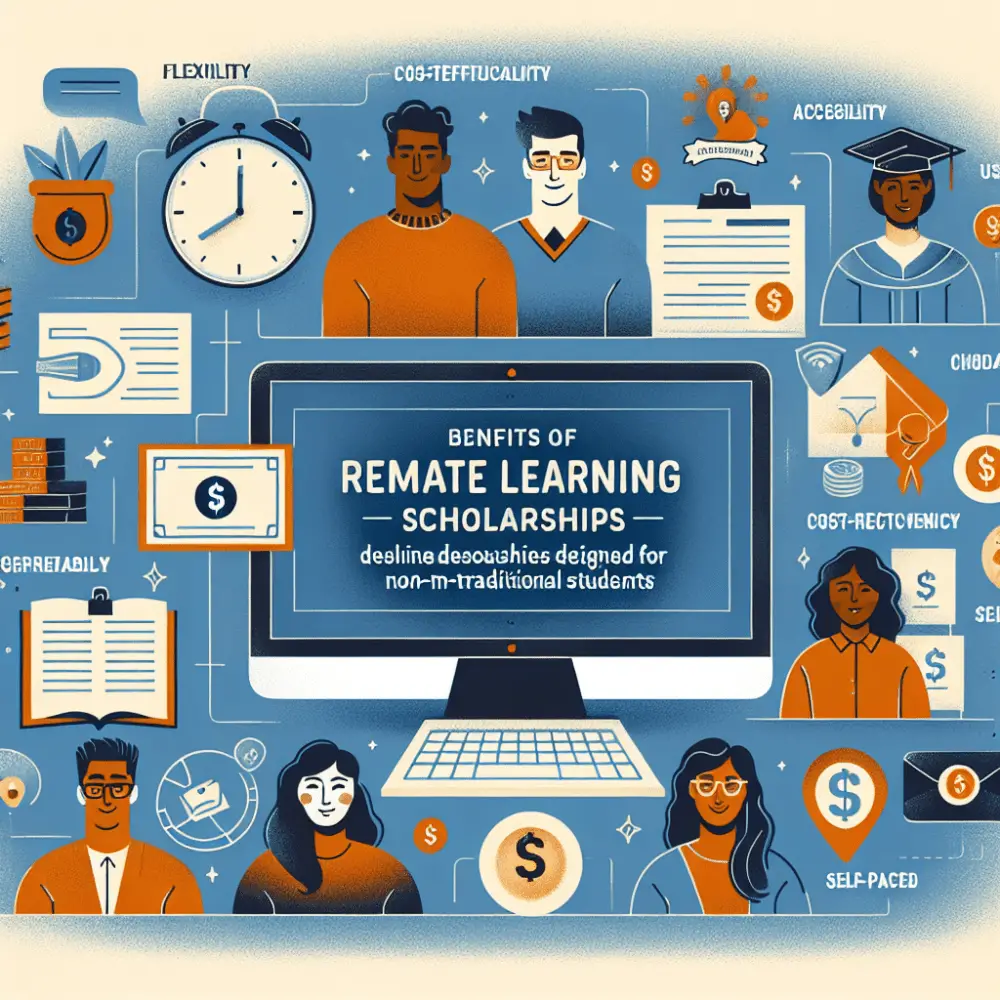
The Benefits of Remote Learning Scholarships for Non-Traditional Students
Remote learning scholarships offer tremendous benefits to non-traditional students. Such scholarships not only alleviate financial burdens but also provide the flexibility needed for learners balancing multiple responsibilities. These scholarships have become increasingly vital in today’s digital age, where education is more accessible online than ever before. Here’s a closer look at the advantages of remote learning scholarships for non-traditional students.
Greater Access to Education
Remote learning opportunities have demolished the geographical barriers that once limited access to education. Non-traditional students, who might be older, working full-time jobs, or managing family responsibilities, often find it challenging to attend on-campus classes. These students can now enroll in online programs from prestigious institutions without relocating or commuting long distances. With scholarships specifically for remote learning, such as the $2,000 "Privacy Matters" College Scholarship, financial hardships are further reduced, making education more accessible and attainable.
Financial Relief
One of the most significant advantages of scholarships is financial assistance. Many non-traditional students face considerable financial strain. They may have children to support or need to maintain a steady income. Scholarships like the $7,400 Agricultural Technology Fellowship in Brazil, 2024, can provide substantial economic relief, allowing these students to focus more on their studies and less on financial worries. This support can cover tuition fees, the cost of books, and even living expenses, making higher education more feasible.
Flexibility and Convenience
Remote learning offers unparalleled flexibility, a crucial factor for many non-traditional students. They can choose when and where to study, fitting education into their already busy lives. This mode of learning is perfect for parents needing to care for children or for those who work irregular hours. Scholarships that cater to online programs enhance this flexibility by ensuring that financial constraints do not force students to abandon their education due to the need for immediate income.
Enhanced Career Opportunities
Obtaining a degree, certificate, or other educational qualification can significantly improve career prospects. However, the cost and time commitment of traditional on-campus programs can be prohibitive. Remote learning scholarships help bridge this gap. For example, the $7,400 Agricultural Technology Fellowship in Brazil, 2024, specifically caters to those interested in advancing their knowledge and skills in a specialized field remotely. By minimizing financial obstacles, these scholarships enable students to gain qualifications that make them more competitive in the job market.
Supportive Community
Despite the physical separation, remote learning programs often foster a strong sense of community. Many institutions offer virtual study groups, online forums, and other digital platforms where students can interact, share resources, and offer mutual support. Scholarships play a crucial role in creating this supportive environment by attracting a diverse student body committed to succeeding together. This camaraderie can be incredibly motivating and result in a more enriching learning experience.
Technological Proficiency
Remote learning inherently boosts technological skills. Students must navigate various online platforms, use digital communication tools, and often engage with cutting-edge educational technologies. These skills are invaluable in today’s job market, where tech-savviness is frequently required. By supporting non-traditional students financially, scholarships enable them to gain these crucial competencies at a pace that suits their unique circumstances.
Lower Overall Costs
Studying from home eliminates many expenses associated with on-campus education, such as commuting, housing, and meal plans. Nevertheless, the primary cost – tuition – can still be a barrier. Remote learning scholarships address this issue by providing financial aid that covers or reduces tuition costs. This dual benefit, reduced secondary expenses and covered tuition, makes education more affordable and appealing to non-traditional students.
Cultural Exchange and Broader Perspective
Some scholarships, like the $7,400 Agricultural Technology Fellowship in Brazil, 2024, offer more than just financial aid; they provide opportunities for cultural exchange and international learning. These experiences can broaden a student’s perspective, introducing new ideas and approaches that enrich their education and personal development. Even though the primary mode of learning is remote, students can still engage in virtual exchanges or short-term study abroad programs included in their scholarship package.
Customized Learning Pace
Non-traditional students often appreciate the ability to learn at their own pace. Unlike traditional classroom settings, remote learning allows for a more customized educational journey. Scholarships for online learning enable students to pursue their education without the pressure of financial deadlines. They can take extra time to master challenging subjects or accelerate through material they find easier, optimizing their learning experience.
Encourages lifelong learning
Remote learning scholarships also promote lifelong learning. Many non-traditional students may already be established in their careers but seek additional qualifications to stay current or pivot to new fields. Scholarships alleviate the financial burden of continuous education, making it feasible for individuals to pursue multiple degrees or certificates throughout their lifetimes. This commitment to ongoing learning can lead to greater career satisfaction and personal fulfillment.
Case Studies and Success Stories
Numerous success stories illustrate the profound impact of remote learning scholarships on non-traditional students’ lives. For instance, a working mother might receive the $2,000 "Privacy Matters" College Scholarship to fund her studies in cybersecurity. This not only boosts her career but also sets an educational example for her children. Similarly, a mid-career professional awarded the $7,400 Agricultural Technology Fellowship in Brazil, 2024, can gain advanced knowledge in agricultural technology, enhancing his contributions to his current job or opening doors to new opportunities.
Conclusion
In summary, remote learning scholarships are a game-changer for non-traditional students. They provide essential financial relief, enable flexible learning schedules, and open up new career opportunities. Moreover, they create a supportive online community, enhance technological skills, and lower overall educational costs. By encouraging lifelong learning and offering cultural exposure, these scholarships empower non-traditional students to achieve their educational and professional goals. Programs such as the $2,000 "Privacy Matters" College Scholarship and the $7,400 Agricultural Technology Fellowship in Brazil, 2024, are prime examples of how tailored financial aid can transform the educational landscape for those who need it most.












